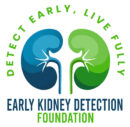RESOURCES

Helpful Tips for Maintaining Kidney Health
- Stay Hydrated: Aim for eight glasses of water daily to help your kidneys flush out toxins.
- Eat a Balanced Diet: Focus on whole foods like fruits, vegetables, and whole grains. Limit processed foods and added sugars.
- Maintain a Healthy Weight: Regular exercise and a balanced diet can help prevent obesity, a risk factor for CKD.
- Reduce Sodium Intake: Limit processed foods and salty snacks. Opt for low-sodium alternatives.
- Manage Protein Intake: Consult your doctor to determine the appropriate amount of protein for your needs.
- Control Blood Pressure: Monitor regularly and work with your doctor to keep it under control.
- Manage Blood Sugar: Essential for diabetes management to prevent CKD.
- Don’t Smoke: Smoking reduces blood flow to the kidneys and increases the risk of CKD.
- Limit Alcohol Consumption: Drink in moderation or avoid it altogether.
- Get Regular Checkups: Early detection of CKD leads to better long-term outcomes.
- Listen to Your Body: Pay attention to changes in urination, fatigue, or unexplained swelling and consult your doctor if needed.
Note: This information is not medical advice. Consult with a healthcare professional for personalized recommendations.

- National Institute of Diabetes and Digestive and Kidney Diseases: https://www.niddk.nih.gov/health-information/kidney-disease/chronic-kidney-disease-ckd
- Mayo Clinic: https://www.mayoclinic.org/diseases-conditions/chronic-kidney-disease/multimedia/vid-20522473
Early Detection:
- National Kidney Foundation: https://www.kidney.org/
- American Kidney Fund: https://www.kidneyfund.org/know-your-kidneys/cause
Living with CKD:
- National Kidney Foundation: https://www.niddk.nih.gov/health-information/community-health-outreach/information-clearinghouses/nkdep
- American Association of Kidney Patients: https://aakp.org/
Additional Resources:
- Kidney Care Alliance: https://nonprofitkidneycare.org/
- The Transplantation Society: https://tts.org/
FAQs
Your kidneys are two bean-shaped organs that filter waste products and excess fluids from your blood. They also play a crucial role in maintaining blood pressure, bone health, and red blood cell production.
High blood pressure, diabetes, family history of kidney disease, obesity, smoking, and certain medications are all risk factors for CKD.
Some signs of kidney disease can be subtle and include frequent urination, especially at night, blood in the urine, persistent puffiness around the eyes or ankles, high blood pressure, fatigue, and loss of appetite. If you experience any of these symptoms, it’s important to see a doctor.
Early detection allows for early intervention and treatment, which can significantly slow the progression of CKD and prevent serious complications.
Early detection of CKD often involves a simple urine test to check for protein and a blood test to measure creatinine levels, which can indicate how well your kidneys are filtering waste. Sometimes, imaging tests like ultrasounds might also be used.
Talk to your doctor about your risk factors and whether screening is right for you. The EKDF also partners with healthcare providers to offer screening events in various communities.
Treatment options for CKD vary depending on the severity of the condition. They might include lifestyle modifications, medication to manage blood pressure and blood sugar, and dietary changes. In some advanced cases, dialysis or kidney transplant might be necessary.
Yes, the EKDF offers a variety of resources and support groups for individuals diagnosed with CKD. This includes educational materials, online forums, and connections to mental health professionals specializing in chronic conditions.
